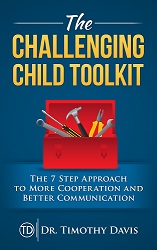On August 24, 2011 Steve Jobs submitted his letter of resignation to Apple’s board of directors. When people think Steve Jobs, they think incredibly influential innovator and entrepreneur. As a child, however, Jobs describes himself as having been a “little tyrant.” He hated school, tested every rule and limit, and challenged the patience of his parents and teachers. Steve Jobs was a challenging boy.
Steve Jobs’s challenging boy nature, however, didn’t limit his success. In fact, it played a key role in his phenomenal achievements. He was uncompromising and determined in the pursuit of his vision. He challenged convention, challenged himself, and challenged his colleagues to think bigger, work harder, and achieve more than they could have ever imagined. Steve Jobs’s story is helpful to keep in mind when dealing challenging boys who challenge the limits of our patience. It reminds us of the tremendous potential contained in a challenging boys’ challenging personality. One mom of a challenging boy summed it up beautifully, “His greatest personal strengths are exactly those things that make it most difficult to be his parent.”
Daniel Alef’s biography, Steve Jobs: The Apple of Our i, depicts Jobs as a classic example of a challenging boy. We find out that Jobs was “hyperactive, constantly pressing the limits of childhood … testing, prodding, always determined.” Of himself Jobs said, “I was pretty bored at school and turned into a little tyrant.” According to Alef, at age 11 Jobs refused to go to school. This defiance eventually forced his parents to move to a new school district for fear that he would never return to school. Jobs was also passionate, and he developed an intense interest in electronics. This interest would eventually lead to his meeting fellow rebel and outside-the-box thinker Steve Wozniak. Later the two would team up to found Apple Computer.
As an adult, Steve Job’s challenging boy nature played a key role in his phenomenal success. He was uncompromising (to the point of being rigid) and determined (to the point of being obsessed). Job’s vision of how things should be drove him and he pursued it with all of his energy. Jobs challenged those who worked with him to be just as driven.
As an adult, Jobs didn’t stop being challenging, in the sense of difficult to work with. Abel describes Jobs’s personality as “direct, abrupt, impatient, and determined. … he wanted things done his way, on his terms and his time schedule.” John Sculley, one time Apple CEO, described Jobs as “a zealot” with “a vision so pure that he couldn’t accommodate that vision to the imperfections of the world.” An Apple board member said of Jobs that “he was uncontrollable … He got ideas in his head, and the hell with what anybody else wanted to do.”
Job’s life story powerfully illustrates the double-edged nature of challenging boys. Challenging boys definitely are “challenging” in the sense that they can be oppositional, difficult, defiant, manipulative, willful, noncompliant, rigid, angry, temperamental, and rebellious and they tend to make life difficult for their parents and teachers. However, the challenging side of these boys’ personalities also has many important positive qualities as well. They are bright, curious, creative, passionate and sensitive kids who have a very strong sense of the way things should be done. They are capable of great things and have important contributions to make to the world if they do not become too turned off by the world’s frequent negative reaction to their challenging personalities.
After years of frustration, many parents understandably find it difficult to see their challenging boy’s personal qualities as strengths. Instead of sensitive, we experience our sons to be easily hurt and angry. Instead of energetic, driven, and persistent, he is stubborn. Instead of principled and committed, we find him rigid and inflexible. Instead of creative and insightful, he seems sneaky and manipulative. Finally, the challenging boy’s greatest asset – his advocating and innovating spirit – is experienced by us as his having an oppositional and contrarian nature.
Jobs’ story reminds us not to forget the positive and potential in these boys’ forceful personalities. It also reminds us that our goal is not to turn our challenging boys into compliant boys, but help them learn to fight important battles (not every battle), to oppose unjust authority (not every authority), and to take other peoples’ feelings into account even as they pursue their own uncompromising vision.
Visit these earlier posts for tips on how to end the power struggles with your son, while respecting and preserving his strengths as a challenging boy.
How to get kids to cooperate: Think like a firefighter!
The Parent Diary: A Powerful Tool for Decreasing Power Struggles

